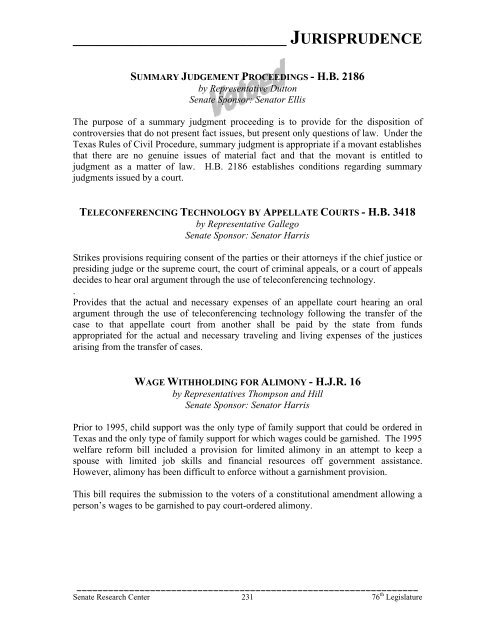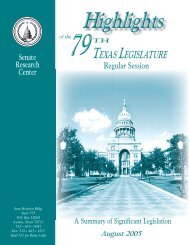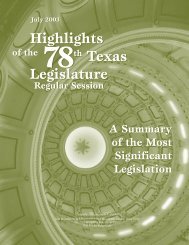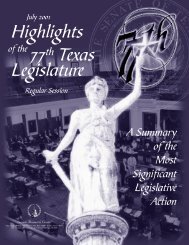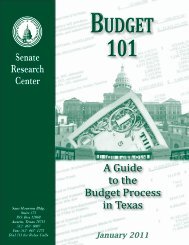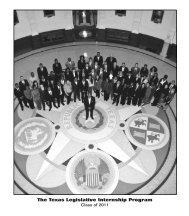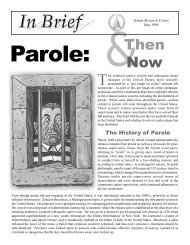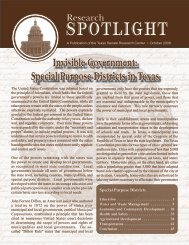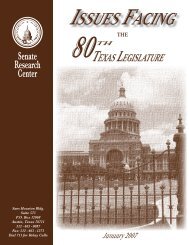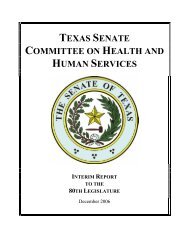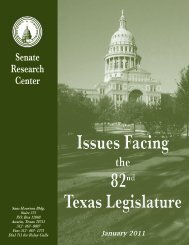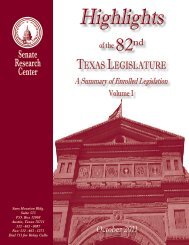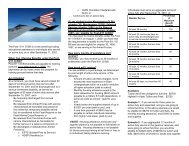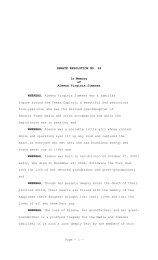- Page 1 and 2:
July 1999 Highlights of the 76th Te
- Page 3 and 4:
_________________ TABLE OF CONTENTS
- Page 5 and 6:
_________________ TABLE OF CONTENTS
- Page 7 and 8:
_________________ TABLE OF CONTENTS
- Page 9 and 10:
_________________ TABLE OF CONTENTS
- Page 11 and 12:
_________________ TABLE OF CONTENTS
- Page 13 and 14:
_________________ TABLE OF CONTENTS
- Page 15 and 16:
_________________ TABLE OF CONTENTS
- Page 17 and 18:
_________________ TABLE OF CONTENTS
- Page 19 and 20:
_________________ APPROPRIATIONS AC
- Page 21 and 22:
_________________ APPROPRIATIONS AC
- Page 23 and 24:
_________________ APPROPRIATIONS AC
- Page 25 and 26:
_________________ APPROPRIATIONS AC
- Page 27 and 28:
_________________ APPROPRIATIONS AC
- Page 29 and 30:
____________________________BANKING
- Page 31 and 32:
____________________________BANKING
- Page 33 and 34:
_____________________ BORDER AFFAIR
- Page 35 and 36:
_____________________ BORDER AFFAIR
- Page 37 and 38:
_____________________ BORDER AFFAIR
- Page 39 and 40:
_____________________________BUDGET
- Page 41 and 42:
_____________________________BUDGET
- Page 43 and 44:
_____________________________BUDGET
- Page 45 and 46:
_____________________________BUDGET
- Page 47 and 48:
_____________________________BUDGET
- Page 49 and 50:
_____________________________BUDGET
- Page 51 and 52:
_____________________________BUDGET
- Page 53 and 54:
_____________________________BUDGET
- Page 55 and 56:
_____ CRIMINAL JUSTICE/DOMESTIC VIO
- Page 57 and 58:
_____ CRIMINAL JUSTICE/DOMESTIC VIO
- Page 59 and 60:
______________ CRIMINAL JUSTICE/GAN
- Page 61 and 62:
______________ CRIMINAL JUSTICE/GAN
- Page 63 and 64:
____________ CRIMINAL JUSTICE/JUVEN
- Page 65 and 66:
____________ CRIMINAL JUSTICE/JUVEN
- Page 67 and 68:
____________ CRIMINAL JUSTICE/JUVEN
- Page 69 and 70:
_________CRIMINAL JUSTICE/SEX OFFEN
- Page 71 and 72:
_________CRIMINAL JUSTICE/SEX OFFEN
- Page 73 and 74:
_____________ CRIMINAL JUSTICE/GENE
- Page 75 and 76:
_____________ CRIMINAL JUSTICE/GENE
- Page 77 and 78:
_____________ CRIMINAL JUSTICE/GENE
- Page 79 and 80:
_____________ CRIMINAL JUSTICE/GENE
- Page 81 and 82:
_____________ CRIMINAL JUSTICE/GENE
- Page 83 and 84:
_____________ CRIMINAL JUSTICE/GENE
- Page 85 and 86:
_____________ ECONOMIC DEVELOPMENT
- Page 87 and 88:
_____________ ECONOMIC DEVELOPMENT
- Page 89 and 90:
_____________ ECONOMIC DEVELOPMENT
- Page 91 and 92:
____________________ EDUCATION/HIGH
- Page 93 and 94:
____________________ EDUCATION/HIGH
- Page 95 and 96:
____________________ EDUCATION/HIGH
- Page 97 and 98:
____________________ EDUCATION/HIGH
- Page 99 and 100:
____________________ EDUCATION/HIGH
- Page 101 and 102:
____________________ EDUCATION/HIGH
- Page 103 and 104:
____________________ EDUCATION/HIGH
- Page 105 and 106:
____________________ EDUCATION/HIGH
- Page 107 and 108:
____________________ EDUCATION/PUBL
- Page 109 and 110:
____________________ EDUCATION/PUBL
- Page 111 and 112:
____________________ EDUCATION/PUBL
- Page 113 and 114:
____________________ EDUCATION/PUBL
- Page 115 and 116:
____________________ EDUCATION/PUBL
- Page 117 and 118:
____________________ EDUCATION/PUBL
- Page 119 and 120:
____________________ EDUCATION/PUBL
- Page 121 and 122:
____________________ EDUCATION/PUBL
- Page 123 and 124:
____________________ EDUCATION/PUBL
- Page 125 and 126:
__ HEALTH & HUMAN SERVICES/CHILD CA
- Page 127 and 128:
HEALTH & HUMAN SERVICES/CHILD CUSTO
- Page 129 and 130:
HEALTH & HUMAN SERVICES/CHILD SUPPO
- Page 131 and 132:
HEALTH & HUMAN SERVICES/CHILD SUPPO
- Page 133 and 134:
HEALTH & HUMAN SERVICES/CHILD SUPPO
- Page 135 and 136:
____HEALTH & HUMAN SERVICES/CHILDRE
- Page 137 and 138:
____HEALTH & HUMAN SERVICES/CHILDRE
- Page 139 and 140:
____HEALTH & HUMAN SERVICES/CHILDRE
- Page 141 and 142:
____HEALTH & HUMAN SERVICES/CHILDRE
- Page 143 and 144:
_ HEALTH & HUMAN SERVICES/HEALTH CA
- Page 145 and 146:
_ HEALTH & HUMAN SERVICES/HEALTH CA
- Page 147 and 148:
_ HEALTH & HUMAN SERVICES/HEALTH CA
- Page 149 and 150:
_ HEALTH & HUMAN SERVICES/HEALTH CA
- Page 151 and 152:
_ HEALTH & HUMAN SERVICES/HEALTH CA
- Page 153 and 154:
_ HEALTH & HUMAN SERVICES/HEALTH CA
- Page 155 and 156:
_ HEALTH & HUMAN SERVICES/HEALTH CA
- Page 157 and 158:
_ HEALTH & HUMAN SERVICES/HEALTH CA
- Page 159 and 160:
_ HEALTH & HUMAN SERVICES/HEALTH CA
- Page 161 and 162:
_ HEALTH & HUMAN SERVICES/HEALTH CA
- Page 163 and 164:
_ HEALTH & HUMAN SERVICES/HEALTH CA
- Page 165 and 166:
__HEALTH & HUMAN SERV./LONG TERM CA
- Page 167 and 168:
__HEALTH & HUMAN SERV./LONG TERM CA
- Page 169 and 170:
__HEALTH & HUMAN SERV./LONG TERM CA
- Page 171 and 172:
__HEALTH & HUMAN SERV./LONG TERM CA
- Page 173 and 174:
__HEALTH & HUMAN SERV./LONG TERM CA
- Page 175 and 176:
____HEALTH & HUMAN SERVICES/MEDICAI
- Page 177 and 178:
____HEALTH & HUMAN SERVICES/MEDICAI
- Page 179 and 180:
____HEALTH & HUMAN SERVICES/MEDICAI
- Page 181 and 182:
____HEALTH & HUMAN SERVICES/MEDICAI
- Page 183 and 184:
_ HEALTH & HUMAN SERVICES/REGULATOR
- Page 185 and 186:
_ HEALTH & HUMAN SERVICES/REGULATOR
- Page 187 and 188:
_ HEALTH & HUMAN SERVICES/REGULATOR
- Page 189 and 190:
_ HEALTH & HUMAN SERVICES/REGULATOR
- Page 191 and 192:
_ HEALTH & HUMAN SERVICES/REGULATOR
- Page 193 and 194:
_ HEALTH & HUMAN SERVICES/REGULATOR
- Page 195 and 196:
_ HEALTH & HUMAN SERVICES/REGULATOR
- Page 197 and 198: _____ HEALTH & HUMAN SERVICES/SUNSE
- Page 199 and 200: _____ HEALTH & HUMAN SERVICES/SUNSE
- Page 201 and 202: _____ HEALTH & HUMAN SERVICES/SUNSE
- Page 203 and 204: _____ HEALTH & HUMAN SERVICES/SUNSE
- Page 205 and 206: _____ HEALTH & HUMAN SERVICES/SUNSE
- Page 207 and 208: _____ HEALTH & HUMAN SERVICES/SUNSE
- Page 209 and 210: _____ HEALTH & HUMAN SERVICES/SUNSE
- Page 211 and 212: _____ HEALTH & HUMAN SERVICES/SUNSE
- Page 213 and 214: _____ HEALTH & HUMAN SERVICES/SUNSE
- Page 215 and 216: _____ HEALTH & HUMAN SERVICES/SUNSE
- Page 217 and 218: _____ HEALTH & HUMAN SERVICES/SUNSE
- Page 219 and 220: ____________________________HOUSING
- Page 221 and 222: ____________________________HOUSING
- Page 223 and 224: ____________________________HOUSING
- Page 225 and 226: __________________________ INSURANC
- Page 227 and 228: __________________________ INSURANC
- Page 229 and 230: __________________________ INSURANC
- Page 231 and 232: __________________________ INSURANC
- Page 233 and 234: __________________________ INSURANC
- Page 235 and 236: __________________________ INSURANC
- Page 237 and 238: __________________________ INSURANC
- Page 239 and 240: ______________________ JURISPRUDENC
- Page 241 and 242: ______________________ JURISPRUDENC
- Page 243 and 244: ______________________ JURISPRUDENC
- Page 245 and 246: ______________________ JURISPRUDENC
- Page 247: ______________________ JURISPRUDENC
- Page 251 and 252: ________ LOCAL GOVERNMENT/ANNEXATIO
- Page 253 and 254: ________ LOCAL GOVERNMENT/ANNEXATIO
- Page 255 and 256: ________ LOCAL GOVERNMENT/ANNEXATIO
- Page 257 and 258: ________ LOCAL GOVERNMENT/ANNEXATIO
- Page 259 and 260: ________ LOCAL GOVERNMENT/ANNEXATIO
- Page 261 and 262: ________ LOCAL GOVERNMENT/ANNEXATIO
- Page 263 and 264: __________ LOCAL GOVERNMENT/GENERAL
- Page 265 and 266: __________ LOCAL GOVERNMENT/GENERAL
- Page 267 and 268: __________ LOCAL GOVERNMENT/GENERAL
- Page 269 and 270: __________ LOCAL GOVERNMENT/GENERAL
- Page 271 and 272: __________ LOCAL GOVERNMENT/GENERAL
- Page 273 and 274: __________ LOCAL GOVERNMENT/GENERAL
- Page 275 and 276: _______ NATURAL RESOURCES/AGRICULTU
- Page 277 and 278: _______ NATURAL RESOURCES/AGRICULTU
- Page 279 and 280: ____________NATURAL RESOURCES/WATER
- Page 281 and 282: ____________NATURAL RESOURCES/WATER
- Page 283 and 284: ____________NATURAL RESOURCES/WATER
- Page 285 and 286: ____________NATURAL RESOURCES/WATER
- Page 287 and 288: __________ NATURAL RESOURCES/GENERA
- Page 289 and 290: __________ NATURAL RESOURCES/GENERA
- Page 291 and 292: __________ NATURAL RESOURCES/GENERA
- Page 293 and 294: __________ NATURAL RESOURCES/GENERA
- Page 295 and 296: __________ NATURAL RESOURCES/GENERA
- Page 297 and 298: __________ NATURAL RESOURCES/GENERA
- Page 299 and 300:
__________ NATURAL RESOURCES/GENERA
- Page 301 and 302:
________________________ REGULATORY
- Page 303 and 304:
________________________ REGULATORY
- Page 305 and 306:
________________________ REGULATORY
- Page 307 and 308:
_______________ STATE AFFAIRS/AGENC
- Page 309 and 310:
_______________ STATE AFFAIRS/AGENC
- Page 311 and 312:
_______________ STATE AFFAIRS/AGENC
- Page 313 and 314:
_______________ STATE AFFAIRS/AGENC
- Page 315 and 316:
_______________ STATE AFFAIRS/AGENC
- Page 317 and 318:
_______________ STATE AFFAIRS/AGENC
- Page 319 and 320:
_______________ STATE AFFAIRS/AGENC
- Page 321 and 322:
_______________STATE AFFAIRS/ELECTI
- Page 323 and 324:
________________ STATE AFFAIRS/GENE
- Page 325 and 326:
________________ STATE AFFAIRS/GENE
- Page 327 and 328:
________________ STATE AFFAIRS/GENE
- Page 329 and 330:
________________ STATE AFFAIRS/GENE
- Page 331 and 332:
________________ STATE AFFAIRS/GENE
- Page 333 and 334:
________________ STATE AFFAIRS/GENE
- Page 335 and 336:
________________ STATE AFFAIRS/GENE
- Page 337 and 338:
________ STATE AFFAIRS/PUBLIC INFOR
- Page 339 and 340:
________ STATE AFFAIRS/PUBLIC INFOR
- Page 341 and 342:
________ STATE AFFAIRS/PUBLIC INFOR
- Page 343 and 344:
________________________________ TA
- Page 345 and 346:
________________________________ TA
- Page 347 and 348:
________________________________ TA
- Page 349 and 350:
________________________________ TA
- Page 351 and 352:
________________________________ TA
- Page 353 and 354:
________________________________ TA
- Page 355 and 356:
________________________________ TA
- Page 357 and 358:
________________________________ TA
- Page 359 and 360:
____________________ TRANSPORTATION
- Page 361 and 362:
___________________________ UTILITI
- Page 363 and 364:
___________________________ UTILITI
- Page 365 and 366:
___________________________ UTILITI
- Page 367 and 368:
___________________________ UTILITI
- Page 369 and 370:
___________________________ UTILITI
- Page 371 and 372:
_________VETERAN & MILITARY AFFAIRS
- Page 373 and 374:
___________ WORKFORCE DEVELOPMENT T
- Page 375 and 376:
___________ WORKFORCE DEVELOPMENT I
- Page 377 and 378:
___________ WORKFORCE DEVELOPMENT R
- Page 379 and 380:
___________ WORKFORCE DEVELOPMENT C
- Page 381 and 382:
___________ WORKFORCE DEVELOPMENT R
- Page 383 and 384:
______________________________ INDE
- Page 385 and 386:
______________________________ INDE
- Page 387 and 388:
______________________________ INDE


